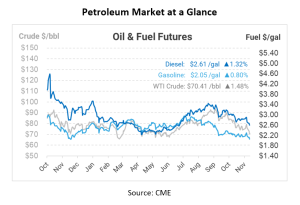
Diesel Additives: A Year-Round Necessity
Diesel fuel has long been a staple for companies that rely on it to power their operations and fleets. Yet, despite its widespread use, many fleet owners and operators may not be fully aware of the crucial maintenance required to keep their engines running smoothly throughout the year.
In this article, we’ll explain why it’s important to treat your fuel year-round to preserve top-notch diesel quality and protect your engine’s performance.
Understanding Diesel Fuel Properties
Did you know that every gallon of gasoline sold in the US and Canada must meet a minimum additive requirement? That’s not true with diesel. The fuel you run in your car has already been treated to ensure optimal performance and engine cleaning, but diesel is untreated since it is not used in as many consumer vehicles. And the results are evident – a 2015 EPA study found that 83% of underground diesel storage tanks have moderate to severe corrosion.
Diesel has unique properties that demand special attention. To ensure your diesel engine functions smoothly, it’s essential to use fuel additives that safeguard these properties. One of the most critical aspects of diesel fuel treatment is addressing temperature-related issues.
During winter, diesel becomes vulnerable to gelling, a process where the paraffin in the fuel solidifies. This can lead to problems such as fuel clouding, tank and filter clogs, difficulty starting your engine, and poor acceleration. To counteract this issue, owners and operators should use diesel additives when temperatures reach or drop below 32°F. Preventing gelling during winter is crucial for maintaining your diesel engine’s performance and avoiding costly repairs. You can learn more about winter fuel prep here.
However, the need for diesel fuel treatment doesn’t end when winter subsides. Poor fuel quality is one of the most common causes of engine malfunctions. Impurities from dirty tanks and poor-quality fuel can lead to fuel injector failures, vehicle downtime, filter plugging, and fuel system failure. Therefore, treating your fuel throughout the year is crucial for maintaining several critical properties of diesel:
- Lubricity: Diesel fuel additives help control lubricity, protecting your engine’s moving parts from premature wear and damage.
- Cetane Rating: Adding a cetane booster each time you fill up your tank can enhance engine power, improve fuel economy, and enhance the performance of pumps and injectors.
- Cold Weather Performance: winter diesel additives ensure that your fuel remains optimized for cold weather conditions, preventing gelling even in unexpected temperature drops.
- Overall Fuel Stability: Diesel is less refined than gasoline, making it prone to changes in properties. Additives help stabilize it, ensuring it meets legal requirements and maintains its quality.
As you can see, treating your diesel fuel year-round is a small investment that can lead to significant savings in repair costs and better overall engine performance. Whether you’re facing the winter chill or enjoying warmer months, treating diesel ensures that your engine will keep running smoothly and efficiently throughout the year.
Solutions to Maintain Peak Performance
Mansfield offers a full range of products and proactive services to ensure high-quality fuel for your fleets, including Arsenal Additives, Tank Cleaning, Repair and Maintenance, Fuel Testing, and Fuel Treatment. Mansfield experts will analyze your fleet and fuel needs as well as your organizational goals to give you a recommendation for a customized prescriptive additive and fuel quality program. Contact us today!

This article is part of Daily Market News & Insights
Tagged: additives, diesel, Fuel Quality
MARKET CONDITION REPORT - DISCLAIMER
The information contained herein is derived from sources believed to be reliable; however, this information is not guaranteed as to its accuracy or completeness. Furthermore, no responsibility is assumed for use of this material and no express or implied warranties or guarantees are made. This material and any view or comment expressed herein are provided for informational purposes only and should not be construed in any way as an inducement or recommendation to buy or sell products, commodity futures or options contracts.





